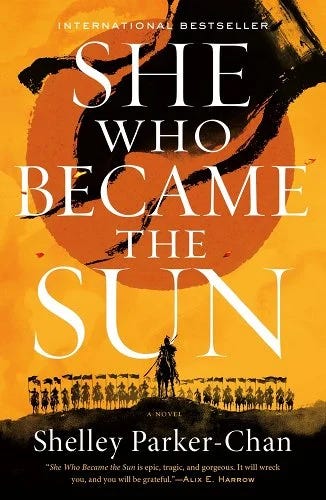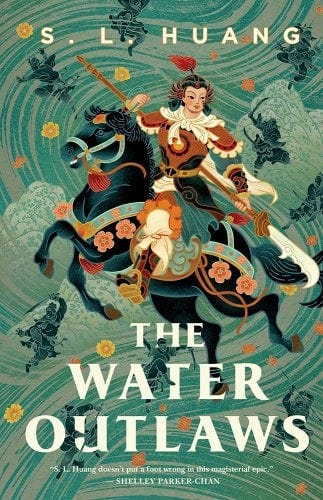Everything I know about Chinese history I learned from historical fantasies
And why I'm not a historian
I’ve always thought that I’m basically one good class away from being a historian. In high school, all my history classes were the classic litany of important dates and events. There was never a story, just, this happened and then that and then, America is perfect and don’t ever question it, the end. That is not a story (and also, it’s a lie, but that’s a whole other essay).
At my college, the general degree requirements were structured in such a way that my one “history” class was taught by an English professor. The class was about the Black Plague and it was cool, but it wasn’t history.
It wasn’t really until graduate school when I began to hang out with actual historians getting their Ph.D.’s that I realized not all history was so, well, boring. Social history is about how ordinary people lived. History can be about how our ideas about gender or race have changed over time, rather than just memorizing a list of the presidents or the kings of England in order (boor-ing!). My friend in graduate school was writing about the history of the vegetarian movement in 19th century America which, one, I hadn’t even known existed, and two, meant there were more vegetarian restaurants per capita in the 1800s then there are now! Now, that’s some interesting stuff.
In fancy sociological terms, history is essential for understanding how the world is socially constructed because it shows us how what we believe is real changes over time. Alas, my exposure to history that wasn’t boring came too late and I ended up a sociologist instead, which luckily means I still get to learn and teach a lot of history. This is mostly what we do in my race and ethnic relations class because you cannot begin to understand the current state of race in the U.S. without understanding its history and, believe me, this is a history you most likely did not get taught anywhere in the public school system.
Maybe all of this explains why I still get most of my history from novels rather than actual, you know, history books. For example, I first became interested in Indian history after I read Rohinton Mistry’s A Fine Balance, an interest which eventually led me to travel to India.
Recently, I’m learning a lot about Chinese history through reading fantasy novels. Yes, I know that sounds weird, but bare with me. It started with The Poppy War by R. F. Kuang. This trilogy is inspired by 20th century Chinese history and the power struggles between Japan, China and England, as well as within different regions of China itself (it’s based roughly on the Sino-Japanese War and the Rape of Nanking). A good follow-up was Kuang’s amazing novel, Babel (also historical fantasy), which takes on the complicated relationships between colonialism and language.
Going backwards in time, I loved Shirley Parker-Chan’s duology, starting with She Who Became the Sun. These novels are set during the waning days of the Yuan dynasty, or the period of Mongol rule when the Khans were in charge, about 1279-1368 CE. Like The Poppy War novels, these are technically fantasy. In the novels, the mandate of heaven—the sign that you could become the ruler of all of China—gives people some magical powers. Basically, if you have the mandate of heaven, you sort of light up and can see ghosts. As fantasy goes, it’s pretty minimalist. Mostly these two books are about this period of history and the rise of the Ming dynasty and, right in my wheelhouse, deep explorations of gender and sexuality. All the main characters have…complicated relationships to their gender and/or sexuality.
This past week I read The Water Outlaws, by S.L. Huang. Yes, another historical fantasy, only this one takes place at the end of the Song Dynasty (960-1279 CE). It’s based on a Chinese classic called Water Margin (or Outlaws of the Marsh) only in Huang’s telling, all the outlaws are women (or identify as women) which is every bit as awesome as you imagine it would be.
It was last night as my husband started The Water Outlaws that I began to actually put together a timeline of all the different time periods my reading of historical fantasy have exposed me to at this point. Does this make me an expert on Chinese history? Fuck, no. Do I know a little bit more than I did before? Yes. Will I go looking now for an actual history of China to fill in the gaps? Probably. I find I’m more interested in history that I already know a little bit about. Or maybe a better way to say that is, something has to peak my curiosity, the way these novels have.
Why tell these books as historical fantasy instead of as just historical fiction? Obviously, I can’t answer that question for certain because I didn’t write the books. I would suggest that people are more likely to read something labeled fantasy than they are to read something labeled just historical fiction. This is especially true given that in my highly scientific estimate, I’d say about 90% of all the historical fiction that gets published in the U.S. is about fucking World War II. Which, okay, yes, it happened. It was a big deal. But there’s a lot of other interesting history out there, so maybe just a few less WWII books?
Beyond the fact that fantasy might make the books more popular or accessible, I think the fantasy element is a useful way of getting at a deeper truth. It’s a bit Emily Dickinson—“Tell the truth, but tell it slant.” In R.F. Kuang’s Babel, language is literally power, as in magical power. But in the reality of colonial history, language was power. And, yeah, in a sort of magical way. The fantasy element is a way to highlight the bigger, historical truth.
At any rate, I’m so glad to be exploring Chinese history this way and so grateful for these amazing authors who are sharing these stories with the world. Here’s to more non-Western, non- WW II historical fiction, in whatever form, fantasy or not.
What’s something you didn’t know and then learned about through a novel?
A short follow-up to last week’s post about how I stopped checking my subscriber count. I still have not checked. At this point, I think I’ve forgotten how many subscribers I had last time I checked, which means effectively, I wouldn’t really be able to tell if I’ve lost or gained subscribers anyway. I’d like to tell you that I don’t even think about checking anymore, but I would be lying. I still think about it. Maybe a tiny bit less. Who knows.
I stopped checking my subscriber count...
Nothing. Nothing happened. Maybe my number of subscribers went up. Maybe it went down. Maybe it stayed the same. I have no idea, because, you know, I stopped looking. I think the last time I looked at my subscriber count was maybe three weeks ago. It was definitely before I went
Some things I read and liked this week:
- on Hemingway. Have I mentioned I wrote a story about Hemingway going on book tour? And, of course, there are cats. You can read it in the Playing Authors Anthology, here.
This essay by
about sewing and fashion and mother-daughter relationships which has me thinking, maybe sewing doesn’t has to be as hard as I imagine it in my head?I loved this second writing prompt from
atOh and this answer to a reader question from
over at about broke my heart. We are all Lou and we all deserve someone like Alex to tell us we are okay.









I admire your ‘intellectual curiosity ‘, of which I have none, so I was told
I have been getting most of my history through historical fiction since I was a young girl.
English history—Norah Lofts and Anya Seton.
WWII—Leon Uris and Herman Wouk.
I haven’t read any of the books you mentioned in this post, but it sounds like my way into Chinese history.
Stories that bring historical periods alive are so much better than rote facts and dates.